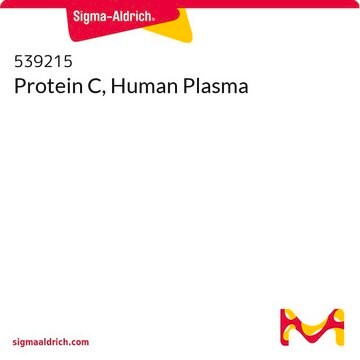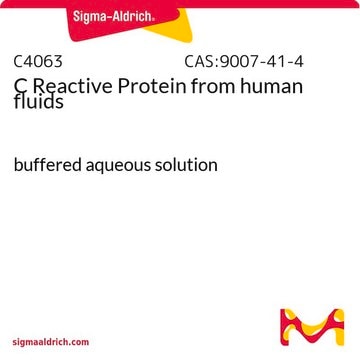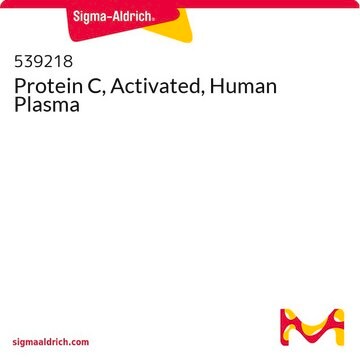P2200
Protein C from human plasma
Activated, lyophilized powder, ≥90% (SDS-PAGE)
Sinonimo/i:
Activated Protein C
Autenticatiper visualizzare i prezzi riservati alla tua organizzazione & contrattuali
About This Item
Numero CAS:
Numero MDL:
Codice UNSPSC:
12352202
NACRES:
NA.61
Prodotti consigliati
Origine biologica
human plasma
Livello qualitativo
Saggio
≥90% (SDS-PAGE)
Forma fisica
lyophilized powder
PM
heavy chain 41 kDa
light chain 21 kDa
tecniche
inhibition assay: suitable
Solubilità
H2O: 1 mg/mL
N° accesso UniProt
Temperatura di conservazione
−20°C
Informazioni sul gene
human ... PROC(5624)
Descrizione generale
Protein C from human plasma is encoded by the gene PROC. In human chromosome, the gene is localised on chromosome 2q14. Activated protein C (APC) cleaves protease activated receptor 1 (PAR1) resulting in cytoprotective and anti-inflammatory effects. Clinical trials with APC implicates its use in treating severe early onset preeclampsia in pregnant women and prolongs pregnancy and helps in perinatal outcomes.
Applicazioni
Protein C from human plasma has been used for pre-treatment of endothelial cells prior to antibody-inhibition assay. It has also been used in activated protein C (APC) assay to determine its inhibitory effect on copper.
Azioni biochim/fisiol
In addition, activated protein C has been shown to inhibit TNF-α induced expression of the inflammatory proteins VCAM, ICAM-I, and Ilk-8 in endothelial cells.
Protein C is a plasma, vitamin κ-dependent zymogen of a serine protease that can inhibit blood coagulation by inhibiting thrombin formation, selectively inactivating Factors Va and VIIIa.
Protein C is a plasma, vitamin κ-dependent zymogen of a serine protease that can inhibit blood coagulation by inhibiting thrombin formation, selectively inactivating Factors Va and VIIIa. The Protein C anticoagulant pathway is triggered when thrombin binds to the endothelial cell proteoglycan, thrombomodulin. This complex, which cannot clot blood, is a potent activator of the protein C zymogen. Activation involves the release of a dodecapeptide from the N-terminal domain of the heavy chain. The activated Protein C (APC) then binds to protein S on cell surfaces and inactivates the coagulation factors Va and VIIIa by proteolysis. APC has also been shown to bind to receptors on the endothelium of large blood vessels.
Stato fisico
Lyophilized powder from 20 mM Tris-HCl, pH 7.4, containing 0.1 M NaCl
Esclusione di responsabilità
RESEARCH USE ONLY. This product is regulated in France when intended to be used for scientific purposes, including for import and export activities (Article L 1211-1 paragraph 2 of the Public Health Code). The purchaser (i.e. enduser) is required to obtain an import authorization from the France Ministry of Research referred in the Article L1245-5-1 II. of Public Health Code. By ordering this product, you are confirming that you have obtained the proper import authorization.
Codice della classe di stoccaggio
11 - Combustible Solids
Classe di pericolosità dell'acqua (WGK)
WGK 3
Punto d’infiammabilità (°F)
Not applicable
Punto d’infiammabilità (°C)
Not applicable
Certificati d'analisi (COA)
Cerca il Certificati d'analisi (COA) digitando il numero di lotto/batch corrispondente. I numeri di lotto o di batch sono stampati sull'etichetta dei prodotti dopo la parola ‘Lotto’ o ‘Batch’.
Possiedi già questo prodotto?
I documenti relativi ai prodotti acquistati recentemente sono disponibili nell’Archivio dei documenti.
I clienti hanno visto anche
Identification of Genetic Variants Linking Protein C and Lipoprotein Metabolism: The ARIC Study (Atherosclerosis Risk in Communities)
Pankow JS, et al.
Arteriosclerosis, Thrombosis, and Vascular Biology, 37(3), 589-589 (2017)
K A Hill et al.
The Journal of biological chemistry, 262(15), 7098-7104 (1987-05-25)
The kinetic properties of the stimulation by Tl+ of the amidase activity of bovine plasma activated protein C (APC) and a limited-proteolytic derivative of this enzyme, des-1-41-light chain APC (GDAPC), which has no remaining gamma-carboxyglutamic acid residues, have been compared
David Stacey et al.
Nature communications, 13(1), 1222-1222 (2022-03-11)
Many individual genetic risk loci have been associated with multiple common human diseases. However, the molecular basis of this pleiotropy often remains unclear. We present an integrative approach to reveal the molecular mechanism underlying the PROCR locus, associated with lower
K A Hill et al.
The Journal of biological chemistry, 261(32), 14991-14996 (1986-11-15)
The kinetic properties of the activation by monovalent cations of the amidolytic activity of bovine des-1-41 light chain activated protein C have been examined. With the cations Cs+, K+, Li+, and Tl+, a single cation site, or class of sites
Rahul Kumar et al.
The Korean journal of pain, 32(3), 168-177 (2019-07-02)
Brennan's rodent paw incision model has been extensively used for understanding mechanisms underlying postoperative pain in humans. However, alterations of physiological parameters like blood pressure and heart rate, or even feeding and drinking patterns after the incision have not been
Il team dei nostri ricercatori vanta grande esperienza in tutte le aree della ricerca quali Life Science, scienza dei materiali, sintesi chimica, cromatografia, discipline analitiche, ecc..
Contatta l'Assistenza Tecnica.







